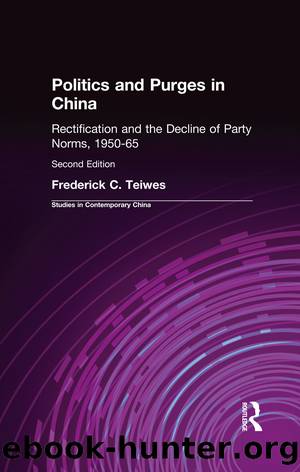Politics and Purges in China by Frederick C Teiwes

Author:Frederick C Teiwes [Teiwes, Frederick C]
Language: eng
Format: epub
Tags: History, Asia, China
ISBN: 9780873321327
Google: gtqFAAAAIAAJ
Publisher: M. E. Sharpe
Published: 1979-01-15T06:03:38+00:00
Organizational Issues
In almost every case purge victims were charged with attacking or attempting to seize control of provincial Party committees. Although occasional mistakes were admitted, the various provincial committees were always treated as essentially upholding the Party line. This was even true in Henan where Pan Fusheng was criticized for attacking the provincial committee before he became first secretary, and bullying and ignoring it afterwards. Although the views criticized at length were, with the one exception, conservative, on a number of occasions people holding those views allegedly accused provincial committees of rightist deviations. Right or left, such opposition was in retrospect considered unprincipled struggle designed to split the Party into cliques. In Liaoning, factional efforts were reportedly so intense that two provincial committees, the legitimate one and an underground competitor, existed side-by-side with the result that political and economic work suffered greatly.35
Even where âanti-Party cliquesâ were apparently less powerful than in Liaoning, their activities weakened Party unity. Cliques assertedly were often active at Party conferences where they introduced jarring notes by behind the scenes politics or âorganized attacks through designated speakers.â When not engaged in attacking provincial committees, they reportedly spent their energy fabricating and spreading rumors against other small groups. Some cliques, for example the Gansu group headed by deposed Vice Governor Sun Diancai, reportedly dated to revolutionary days. Others were only recently formed, as that allegedly established in 1955 by former Guangdong enemies Gu Dacun and Feng Baiju. Cliques were built on several factors. Policy, of course, was one. Another, as in Gansu, was personal relationships of long standing, particularly those based on common service in local guerrilla and underground forces. Party status also provided an important focus for small group activity. Attacks were made on those who used their status as veteran cadres as political capital to develop personal followings.36
Perhaps the most important element in clique building, however, was âlocalismâ (difangzhuyi). The dismissed Governor of Shandong, Zhao Jianmin, reportedly built his influence by saying, âI am a native of Shandong, I am for the people of Shandong and cadres of Shandong.â37 In provinces with many outside cadres, cliques developed on a native-outsider basis. The charge of localism or local nationalism was specifically raised in eight provinces: Zhejiang, Gansu, Guangxi, Guangdong, Liaoning, Shandong, Xinjiang and Yunnan. This problem, which also affected cadres down to the basic levels, is discussed more fully below.
Cliques were viewed with particular alarm where they attained an organizational or territorial base by monopolizing key posts. In several provinces independent kingdoms allegedly appeared: territorial bases were established on Hainan Island by Feng Baiju, in Huimin special district by Li Feng, and in Yinchuan special district by Sun Diancai. Sun also reportedly had an organizational base in the Gansu Peopleâs Council. Another organizational base was the government financial and planning bodies for the Wang Chuoru group in Shandong. Leading posts were also monopolized in Anhuiâs political and legal departments by Li Shinongâs group, and in the Yunnan organization department by the Zheng Dun-Wang Jingru clique.38
One of the most important misuses of organizational power concerned the assignment of cadres.
Download
This site does not store any files on its server. We only index and link to content provided by other sites. Please contact the content providers to delete copyright contents if any and email us, we'll remove relevant links or contents immediately.
Kathy Andrews Collection by Kathy Andrews(10528)
The remains of the day by Kazuo Ishiguro(7558)
Spare by Prince Harry The Duke of Sussex(4202)
Paper Towns by Green John(4171)
The Body: A Guide for Occupants by Bill Bryson(3803)
Be in a Treehouse by Pete Nelson(3216)
Harry Potter and the Goblet Of Fire by J.K. Rowling(3051)
Goodbye Paradise(2966)
Never by Ken Follett(2887)
Into Thin Air by Jon Krakauer(2704)
The Remains of the Day by Kazuo Ishiguro(2622)
The Genius of Japanese Carpentry by Azby Brown(2610)
The Cellar by Natasha Preston(2597)
Drawing Shortcuts: Developing Quick Drawing Skills Using Today's Technology by Leggitt Jim(2532)
120 Days of Sodom by Marquis de Sade(2441)
Architecture 101 by Nicole Bridge(2353)
The Man Who Died Twice by Richard Osman(2301)
Machine Learning at Scale with H2O by Gregory Keys | David Whiting(2295)
Fairy Tale by Stephen King(2073)
